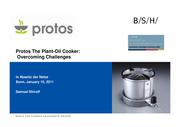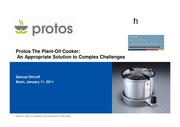Click here to register!
Difference between revisions of "Stove by BSH (protos)"
***** (***** | *****) m |
***** (***** | *****) m |
||
| (8 intermediate revisions by 2 users not shown) | |||
| Line 1: | Line 1: | ||
| + | |||
== BSH, protos the plantoilstove<br/> == | == BSH, protos the plantoilstove<br/> == | ||
| − | The University Hohenheim (Germany), in cooperation with ''' | + | The University Hohenheim (Germany), in cooperation with '''Bosch and Siemens Home Appliances Group (BSH)''', developed protos the plantoilcooker. The basic idea was to develop a cookstove that uses a clean burning renewable liquid fuel that can be produced locally. |
| + | |||
| + | Since the end of 2004, protos has been undergoing field testing in the Philippines together with Leyte State University (now renamed Visayas State University). And from April 2006, protos has been introduced to the broader public with commercial market availability on the islands of Leyte and Samar in the Philippines. Mid 2008 the local manufacturer had the capacity to deliver up to 1500 units per year to these islands. BSH is working to expand availability with pilot projects in planning, underway or concluded in [[Bolivia_Energy_Situation|Bolivia]], Costa Rica, [[Ethiopia_Energy_Situation|Ethiopia]], [[India_Energy_Situation|India]], [[Indonesia_Energy_Situation|Indonesia]], [[Kenya_Energy_Situation|Kenya]], and in [[Tanzania_Energy_Situation|Tanzania]] where it is supported by GTZ. A recently developed 'second generation' of protos plantoilstove technology is said to increase efficiency, reducing noise, cleaning time and the cost of production. The stove was laboratory tested by the independent Aprovecho Research Center in Oregon USA for safety, efficiency and emissions. As a result of the testing the protos was generally labelled as clean-burning, efficient and one of the safest cooking stoves available. | ||
| + | |||
| + | Whether this project will develop into a commercial success remains to be seen. The continuous supply of cheap plant oil and the user acceptance is one of the major challenges. | ||
| + | |||
| + | Bonn, 10.01.2011 | ||
| + | |||
| + | [[File:GIZ Im Abseits der Netze 012011 - Protos Pflanzenölkocher Shiroff.pdf|180px|Einführung eines neuen Produktes in den BoP Markt: der Pflanzenölkocher protos|alt=Einführung eines neuen Produktes in den BoP Markt: der Pflanzenölkocher protos]] | ||
| + | |||
| + | Bonn, 11.01.2011 | ||
| + | |||
| + | [[File:GIZ Im Abseits der Netze 012011 Protos Pflanzenölkocher Shiroff.pdf|180px|File:GIZ_Im_Abseits_der_Netze_012011_Protos_Pflanzenölkocher_Shiroff.pdf|alt=File:GIZ_Im_Abseits_der_Netze_012011_Protos_Pflanzenölkocher_Shiroff.pdf]] | ||
| + | |||
| + | <br/> | ||
| + | |||
| + | = Further Information = | ||
| − | + | *More Information: [http://www.plantoilcooker.com/ http://www.plantoilcooker.com] | |
| + | *[[Portal:Improved_Cooking|Portal:Improved Cooking]]<br/> | ||
| − | + | <br/> | |
| + | [[Category:Kenya]] | ||
| + | [[Category:Indonesia]] | ||
| + | [[Category:India]] | ||
| + | [[Category:Ethiopia]] | ||
| + | [[Category:Costa_Rica]] | ||
| + | [[Category:Bolivia]] | ||
[[Category:Cookstoves]] | [[Category:Cookstoves]] | ||
| + | [[Category:Vegetable_Oil]] | ||
Latest revision as of 13:34, 28 July 2014
BSH, protos the plantoilstove
The University Hohenheim (Germany), in cooperation with Bosch and Siemens Home Appliances Group (BSH), developed protos the plantoilcooker. The basic idea was to develop a cookstove that uses a clean burning renewable liquid fuel that can be produced locally.
Since the end of 2004, protos has been undergoing field testing in the Philippines together with Leyte State University (now renamed Visayas State University). And from April 2006, protos has been introduced to the broader public with commercial market availability on the islands of Leyte and Samar in the Philippines. Mid 2008 the local manufacturer had the capacity to deliver up to 1500 units per year to these islands. BSH is working to expand availability with pilot projects in planning, underway or concluded in Bolivia, Costa Rica, Ethiopia, India, Indonesia, Kenya, and in Tanzania where it is supported by GTZ. A recently developed 'second generation' of protos plantoilstove technology is said to increase efficiency, reducing noise, cleaning time and the cost of production. The stove was laboratory tested by the independent Aprovecho Research Center in Oregon USA for safety, efficiency and emissions. As a result of the testing the protos was generally labelled as clean-burning, efficient and one of the safest cooking stoves available.
Whether this project will develop into a commercial success remains to be seen. The continuous supply of cheap plant oil and the user acceptance is one of the major challenges.
Bonn, 10.01.2011
Bonn, 11.01.2011
Further Information
- More Information: http://www.plantoilcooker.com
- Portal:Improved Cooking





















